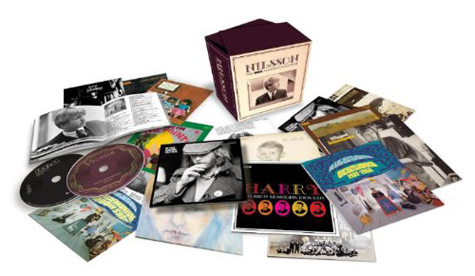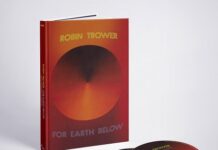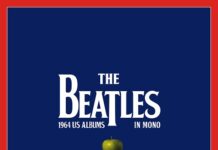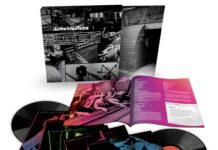With 17 discs, there is a lot of music on Harry Nilsson’s The RCA Albums Collection box set from Legacy. It includes all of the singer-songwriter’s RCA albums, some remixed, loaded with bonus tracks, 48 pages of liner notes and photos, plus three newly compiled CDs — Nilsson Sessions 1967-1968, Nilsson Sessions 1968-1971, and Nilsson Sessions 1971-1974 — containing a total of 58 tracks, half of which are previously unreleased. Is that enough for you? If you’re a diehard fan of the man who penned Three Dog Night’s “One” and the Monkees’ “Cuddly Toy”; enjoyed a number of hits of his own like “Me And My Arrow” and “Coconut”; and topped the charts covering “Everybody’s Talkin” from Midnight Cowboy and Pete Ham’s “Without You,” well then, prepare to splurge.
Pandemonium Shadow Show from 1967 starts us off. This is technically Nilsson’s second album, but his first with RCA, on which his vocals were first termed, “a chorus of 98 voices.” The production reflects an almost carnival-like soundscape with horns layered in on what would prove to be a Nilsson production stamp for many of his early 70s releases. He covers the Phil Spector’s “River Deep Mountain High” (earlier in his song peddling days, the singer worked with the producer), Lennon and McCartney’s “She’s Leaving Home” and a clever congas-driven “You Can’t Do That,” which has at least 14 musical and lyrical references to Beatles songs. This album also has “1941” on it, the start of some very deep personal songs written by Nilsson, centered on the theme of a broken family, one Nilsson was familiar with. The deceptive dance hall horn and accordion-like circus swirl undercuts the seriousness of the subject.
Ariel Ballet and Skiddo, both from 1968, represent two ends of the man’s talent. On Ariel Ballet, we get the original version of “One,” which became a hit for Three Dog Night a year later. Nilsson’s version is certainly more plaintive and lacks the rock and roll touches Three Dog Night added. “Little Cowboy,” a song the singer’s mom wrote, would later be featured in the hit 70s TV show The Courtship of Eddie’s Father. “Mr. Richard’s Favorite Song” is a perfect story with an oboe behind the running vocal. “Everybody’s Talkin’,” would serve to see-saw the public perception of Harry Nilsson between just a singer or just a songwriter. Skidoo, the soundtrack for a movie by the same name, features Nilsson singing the closing credits. The album also offered the opportunity to employ a full Hollywood orchestra and they lavishly roll around some of Nilsson’s more whimsical lyrics.
1969’s Harry seems to be the release Nilsson was really working up to. Now friendly with the Beatles — he was invited to London during the recording of The White Album and penned “The Puppy Song” for Apple Records’ recording artist Mary Hopkin — he returned to the States determined to produce himself, which he did for latter half of these recordings. This was Nilsson’s first album to make the Billboard charts, featuring a very specific group of super L.A. session players and a great bunch of tunes.
There’s a version of “The Puppy Song” with its simple piano and soft popping bass. The rendition of the Beatles’ “Mother Nature’s Son” was reportedly one of the Fab’s personal favorite covers of their songs. The sweet strings, a little banjo, and Nilsson’s voice in a lower register drive “I Guess The Lord Must Be In New York City,” a tune he wrote for Midnight Cowboy but was never used. He also tackles Randy Newman’s “Simon Smith and the Amazing Dancing Bear” (Nilsson’s next release would feature 10 songs, all written by Newman) and the country rockin’ “Rainmaker.”
Though it won Stereo Review’s 1970 “Record of the Year,” Nilsson Sings Newman was not a commercial success. Still, it has its moments with the different movements in “Vine Street” (reminiscent of Newman’s work on the movie “Ragtime”) to the too-sad-to-almost –listen-to “Living Without You.” A stark background of Newman’s piano and layers of Nilsson’s harmonies, this might be one of the most unique albums in his catalog. We get another soundtrack album, actually for Nilsson’s animated TV movie, with The Point. “Me and My Arrow” is here, as effortless a pop vocal as Nilsson (or anybody else) ever managed, along with “Life Line,” another one of those songs about being alone. “Think About Your Troubles” opens with some tea-making bubbles, then unfolds fully with a lyric that encompasses the full circle of life. It’s got a Billy Joel vibe with those amazing Nilsson vocal overdubs.
The quick “Gotta Get Up” gets you up for 1971’s Nilsson Schmilsson, one of the man’s most popular albums. It’s a big quick tune, all jaunty with electric guitar and horns to start what would become a Grammy- nominated Album of The Year. The rocking “Jump Into the Fire” is here as is the silly, one-chord “Coconut” with some inspiring percussion from Jim Gordon and bass from Herbie Flowers. On an album full of hits, “Without You” is probably the best known.
The follow-up, Son Of Schilsson, has “Remember (Christmas),” featuring another killer vocal in a lower register, Nicky Hopkins adding some light and simple piano and guitarist Chris Spedding on bouzouki. That’s George Harrison playing slide on the jaunty, certainly naughty “You’re Breaking My Heart,” with Peter Frampton on the other guitar. “Spaceman” features an acoustic guitar to help move the rhythm along, plus the usual booming strings Nilsson enjoyed so much.
A Little Touch Of Schmilsson In The Night is an album of standards, something Nilsson was very serious about recording. “Lazy Moon,” “It Had To Be You” and a delicate orchestrated “As Time Goes By” are among the 20th century covers here, all perfectly infected by Nilsson’s fine voice. Not a pop album to be sure, at least not in the usual sense, but a great example of the man’s amazing pipes. Son of Dracula, a soundtrack to a movie of the same name, is one that Ringo Starr produced, sunk his money into, and then premiered pretty much without notice. “Daybreak” has a great cowbell with Nilsson’s weird vocal delivery and range.
Pussy Cats features another Beatle behind the boards, made during John Lennon’s infamous “Lost Weekend” in Los Angeles. It’s no news that Harry Nilsson liked his drink, and at this point, his marriages had broken up, his album sales were not like they were, and he and Lennon were running in and out of the studio like madmen. So it’s no wonder that the songs they produced are decidedly desperate and rushed. This is also the time when Nilsson damaged his vocal chords and that damage is evident on this record.
There’s a drunk-sounding (no surprise) Lennon vocal on Jimmy Cliff’s “Many Rivers to Cross,” a delicate, yet rough Nilsson vocal on “Don’t Forget Me” with killer sweet strings behind him. “Black Sails,” introspective and mired in sad strings, never gets off the ground. The rousing “Rock Around the Clock” with three drummers — Keith Moon, Ringo Starr and Jim Keltner — is a little better than most of the tracks.
Duit On Mon Dei appeared in 1975. It’s an interesting collection with tunes like a funky “Kojack Columbo” and a cover of “Easier For Me,” sung in a lower, well controlled register over a cello. Sandman appeared the next year and I love “Thursday (Here’s Why I Did Not Go To Work Today),” especially in its drunken, piano, sexy vocal, jazzy guitar mix with Jim Keltner keeping time.
Nilsson’s voice recovered by 1977’s Knnillssonn, the singer’s 14th studio release. This was supposed to be his comeback but the death of Elvis Presley jettisoned RCA’s focus. That doesn’t take away from the songs though. “All I Think About Is You” has some truly unique bass work from Danny Olney, along with a choir and Nilsson’s baritone vocal. Another highlight comes from frequent Nilsson percussionist and friend Ray Cooper’s multi layering on “I Never Thought I’d Get This Lonely” and the lullaby “Blanket For A Sail.” This leaves the three Sessions CDs, something diehards will like with demos and alternate versions of songs featured on various albums.
To complement the release of The RCA Albums Collection, Legacy has also released The Essential Nilsson, a double-CD set with 40 songs. A biography written by Alyn Shipton on the singer called Nilsson: The Life of a Singer-Songwriter has also been issued. It’s a well-researched tome on every aspect of Nilsson’s life. Getting facts on such a reclusive guy — Nilsson never toured and pretty much birthed rumors and legends in his wake — had to be painstaking. Brought together, nearly 20 years after his untimely death, Harry Nilsson’s The RCA Albums Collection, The Essential Nilsson and Nilsson: The Life of a Singer-Songwriter are pretty much everything you need to explore this truly unique American artist.
~ Ralph Greco, Jr.




















